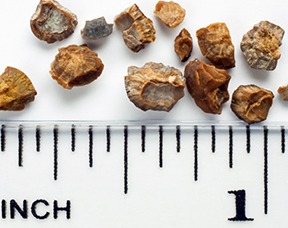There are many different types of kidney stones. These stones can result from a multitude of factors and are determined and classified according to their chemical compositions. The chemical composition of kidney stones is influenced, to a large extent, by diet, lifestyle habits, and hereditary factors. Identifying the type of kidney stone is helpful in discovering the cause of the condition, and knowing the best diet and treatments for recovery. Here are the four types of kidney stones that you should watch out for.
Calcium Stones
Calcium stones are the most common type of kidney stones and result from high levels of calcium oxate in the system. Approximately 80% of all kidney stones are classified as calcium stones. Oxate is a substance found in many foods. A person may run the risk of developing calcium stones if they have a diet which is high in foods such as chocolate, nuts, fruits, vegetables and vitamin D. However it’s not so much the amount of calcium in the diet that usually causes a stone to form but rather the calcium excreted by the kidney collecting system.
Uric Acid Stones
These types of kidney stones only account for about 5% of all kidney stones. Uric acid is a waste product resulting from normal body functioning. However when there is too much present in urine it can cause uric acid stones. People who eat a high-protein diet may be at risk of forming uric acid stones.
Struvite Stones
Struvite stones (also referred to as staghorn kidney stones) accounts for approximately 10% of all kidney stones. They are usually associated with urinary tract infections, which change the urinary environment to permit rapid stone growth. Consequently, the stone formed can become very large in size. If left untreated they can cause chronic infection, destroy the kidney, and may result in death.
Cystine Stones
Less common (about 1%) are kidney stones made of a chemical called cystine. Cystine stones result from a genetic disorder called Cystinuria. This occurs when the kidneys do not reabsorb cystine from the urine. When high amounts of cystine is detected in the urine, it causes these stones to form. Cystine stones also have the tendency to grow rapidly and recur, and may even lead to kidney failure if not treated quickly.
Kidney stones can vary in both their type and size but can also be incredibly painful. Most types of kidney stones can easily be prevented by simply adopting an appropriate diet and healthier lifestyle habits. Adequate fluid intake (especially water), on a daily basis is also an extremely important preventative measure that can help to prevent the formation of kidney stones.


